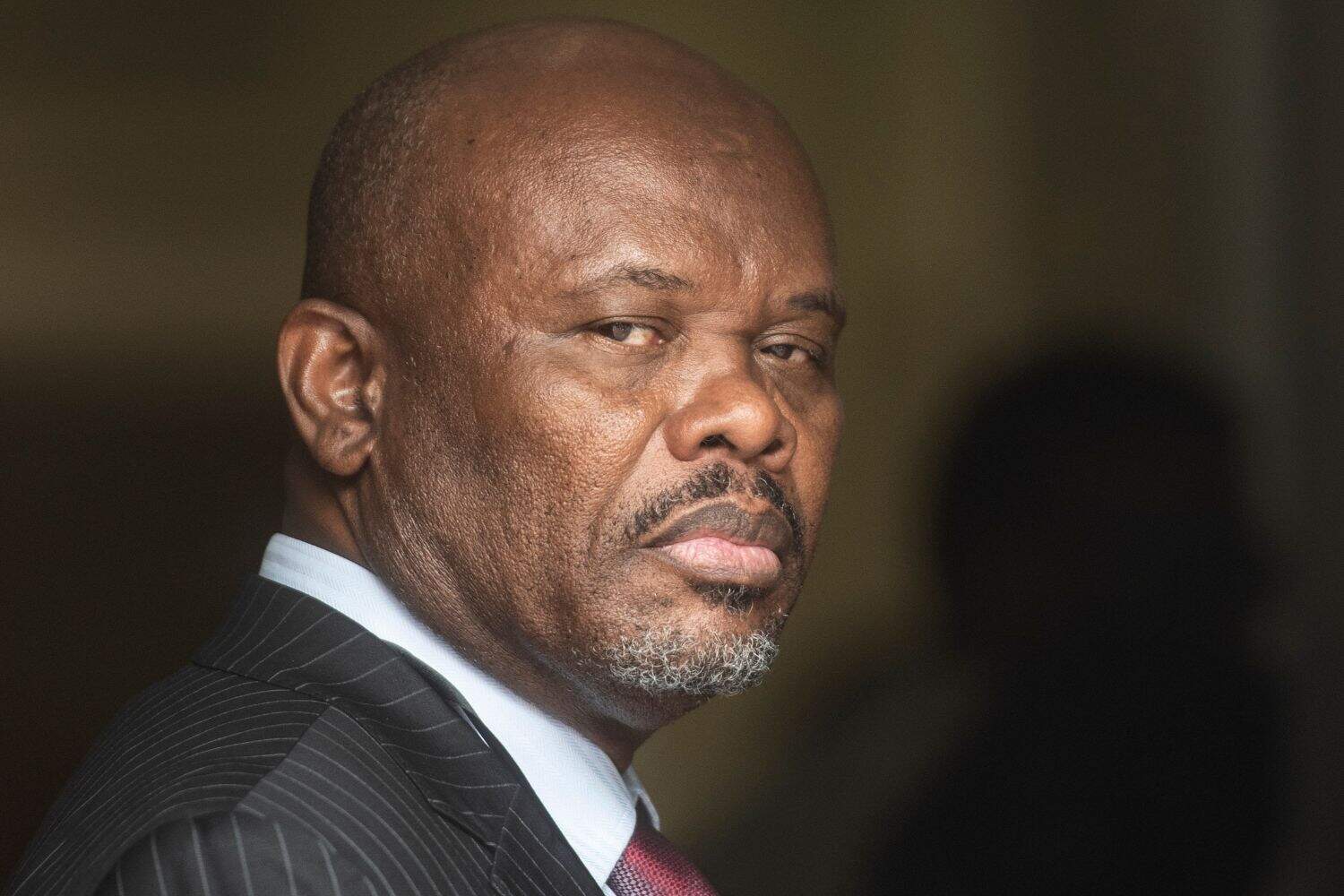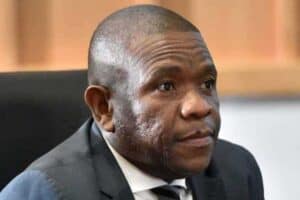Tennsions arose during the investigation into the murder of musician Kiernan 'AKA' Forbes.

Suspended Deputy National Police Commissioner Shadrack Sibiya on Monday presented his version of events before Parliament’s ad hoc committee following serious allegations against him.
Sibiya testified at the parliamentary inquiry investigating claims of political interference in police operations and the alleged involvement of politicians in criminal cartels.
The committee has already heard testimony from KwaZulu-Natal (KZN) police commissioner Nhlanhla Mkhwanazi and National Commissioner Fannie Masemola, who alleged that Sibiya and Police Minister Senzo Mchunu — currently on special leave — were involved in the criminal infiltration of the justice system.
It is alleged that Sibiya unlawfully ignored Masemola’s directive that the political killings task team (PKTT) be phased out gradually, opting instead for its immediate disbandment as ordered by Mchunu.
He also allegedly instructed that the KZN-based unit’s dockets be sent to the head office of the South African Police Service (Saps), effectively halting investigations.
Sibiya, who was suspended last month, is also said to be “close” friends with attempted murder accused and tenderpreneur Vusimuzi “Cat” Matlala.
Conflict of interest raises tensions
Proceedings began with the committee being informed that DA MP Lisa-Marie Schickerling had withdrawn from the inquiry due to a conflict of interest.
Schickerling and MK party MP David Skosana had both laid criminal complaints against Sibiya and Mchunu prior to the establishment of the inquiry.
DA MP Glynnis Breytenbach informed the committee that Schickerling would be replaced by fellow party member Damien Klopper.
Evidence leader Norman Arendse indicated that an affidavit filed in the Gauteng High Court by KZN Serious Violent Crime Unit head William Sipho Kunene — used to secure search and seizure warrants at the homes of Sibiya, Mchunu and the minister’s chief of staff Cedric Nkabinde — listed Schickerling and Skosana as complainants.
“It’s clearly not fair for someone who has been a complainant in a matter against one of our witnesses to then again sit on this committee having already arguably prejudged the matter, hence the complaint,” Arendse said.
ALSO READ: ‘I will not resign,’ says defiant Sibiya as police raid his house
This sparked debate about whether Skosana should also recuse himself.
MK party MP Sibonelo Nomvalo argued that the complaint was laid on behalf of his party, and therefore, if Skosana were to be recused, all MK party members should be barred from participating.
Sibiya was temporarily excused while MPs deliberated further.
After extended discussion, committee chairperson, ANC MP Soviet Lekganyane, said that a legal opinion would be sought and the matter referred to National Assembly Speaker Thoko Didiza.
Watch the inquiry below:
Sibiya testifies at Mkhwanazi ad hoc commitee
Following a brief adjournment, Sibiya took his oath and began his testimony.
He expressed concern about Skosana’s continued participation and was allowed to consult his legal team before proceeding.
Sibiya then continued to testify “under protest”.
“I believe that I will be participating in a process that could be tainted,” he told MPs.
Tracing his career, Sibiya said he joined the police in 1989 and later obtained a diploma in police administration and a B.Tech degree in policing in 1996 and 2008 respectively.
He is currently pursuing a master’s degree in criminal justice.
READ MORE: Madlanga commission: Mkhwanazi questions Sibiya’s promotion despite ‘questionable background’
Sibiya joined the Scorpions in 2001 as a senior special investigator and was promoted to chief investigator in 2005.
After the Scorpions were disbanded in 2009, he moved to the Hawks (DPCI) and became the provincial head in Gauteng the following year.
‘I made a lot of enemies’
He said he “made a lot of enemies” after investigating former Crime Intelligence head Richard Mdluli, who was arrested for fraud and corruption involving the misuse of funds from the police’s secret service account.
He claimed this investigation led to him being charged in court over the alleged unlawful rendition of Zimbabwean suspects.
“Many cases were opened against me,” Sibiya said, adding that he was also suspended and charged with a fraudulent kilometre claim.
City of Joburg tenure
Sibiya referred to his dismissal in 2015, which was later overturned.
“This took me almost seven years to fight this thing to return back to the police having been dismissed for a crime I did not commit, which is a similar situation I am facing now.”
He subsequently worked for the City of Johannesburg.
“I was at home, I was looking for a job and an opportunity came from the City of Joburg. I applied like many others and I was employed.”
Sibiya became head of the Group Forensic Investigation Services (GFIS) in 2019.
READ MORE: Court dismisses Shadrack Sibiya’s application to go back to work
His appointment was later found to be proper by a Public Protector report.
When the Labour Court ruled in his favour in May 2022, Sibiya returned to Saps and was compensated for the period he was unemployed to avoid “double-dipping”.
“It was a reinstatement as if I never left. I was supposed to actually be paid for the whole five or six years I was out … so the court said we will only reimburse for the period you were unemployed.”
The Madlanga commission previously heard that Sibiya was under investigation for corruption and fraud involving R3.5 million in alleged unlawful gratification and R580 000 in irregular expenditure while at the City of Johannesburg.
This prompted then-executive director Mesuli Mlandu to write to former police minister Bheki Cele, expressing concern about Sibiya’s return to Saps as head of the Organised Crime Unit in July 2022.
Sibiya explained that he did not return to the Hawks because another major-general had filled his former position, and he chose not to fight for his old job.
Deputy national commissioner role
A year later, in July 2023, Sibiya was appointed Deputy National Police Commissioner for Crime Detection by Masemola.
He dismissed claims that his rise was unusually rapid.
“It was not in very short space of time. Remember it was a reinstatement since I became a major-general in 2010 streches up until 2023, which how is many years?”
In his current position, he oversees Detective Forensic Services and Crime Intelligence divisions.
Sibiya explained that it would be an “impossible task” for the National Police Commissioner to manage all operations alone, hence the need for deputies with delegated authority.
READ MORE: Sibiya wanted control of dockets ‘right from the beginning’ – Masemola tells Madlanga commission
He confirmed that Crime Intelligence head Dumisani Khumalo, who oversaw the PKTT, reports directly to him.
Sibiya said the PKTT — ordered by Mchunu to be disbanded in a letter dated 31 December 2024 — should have fallen under his authority but did not, due to what he described as a “very weird arrangement”.
He questioned why a task team comprising mostly detectives reported to Khumalo and then to Mkhwanazi.
“As far as I am concerned, if I am the deputy national police commissioner that is responsible for detectives in general, intelligence as well, and I have got a top secret clearance certificate, I need to know and understand why I can’t be interested with knowing what this team is doing,” Sibiya said.
He added that other politically related murders were referred to the PKTT, which he found concerning.
Relationship with Mchunu
Sibiya described his relationship with Mchunu as strictly professional, saying he met the minister for the first time upon his appointment.
“There was a standard arrangement and agreement that if the minister calls you, you can’t say no but do let the national commissioner know. This is how it works.”
He said police officials often wait “with bated breath” when a new minister is appointed.
Sibiya’s tensions with Mkhwanazi
Testifying about his relationship with Mkhwanazi, Sibiya said it was “good” until tensions arose during the investigation into the murder of musician Kiernan “AKA” Forbes.
He recounted that former minister Bheki Cele had questioned whether the correct suspects were arrested.
Although he assured Cele that this was the case, the then minister requested a briefing, so Sibiya contacted the KZN deputy police commissioner, as Mkhwanazi was usually busy.
“Normally when I contact him, he is busy in a meeting.”
Sibiya said Mkhwanazi was unhappy about this.
“I never thought he would make a big deal out of this,” he said.
He told the committee that after apologising to Mkhwanazi, the KZN police commissioner informed him that no officer would be travelling to Pretoria for the meeting requested by Cele.
“‘I don’t report to politicians’, that’s what he said,” Sibiya remarked, adding that Mkhwanazi told him to pass the message to Cele.
READ MORE: Nhlanhla Mkhwanazi denies his allegations are part of a political campaign
Sibiya said he didn’t appreciate Mkhwanazi’s “aggressive” tone and reminded him that he was his senior, which further escalated the exchange.
“I said ‘but general when you order me and I must go tell the minister that, you are ordering me around now’.”
Masemola later convened a meeting to resolve the dispute in February this year.
While Mkhwanazi previously told the inquiry that he would not “shake hands with a criminal”, Sibiya disputed this.
“It’s not true. It was a very mature meeting. There were no fights because immediately after that meeting General Mkhwanazi invited me to the Police Excellence Awards.”
Sibiya maintained that their relationship remained cordial until Mkhwanazi’s 6 July press briefing, where he made allegations against Sibiya and Mchunu.
He recalled that Mkhwanazi had even called him on 4 July to ask whether he would attend the Durban July event, referring to him as “boss”.
“Even on 4th of July, the eve of the press conference, I spoke to him and I didn’t know or see it coming actually.”






